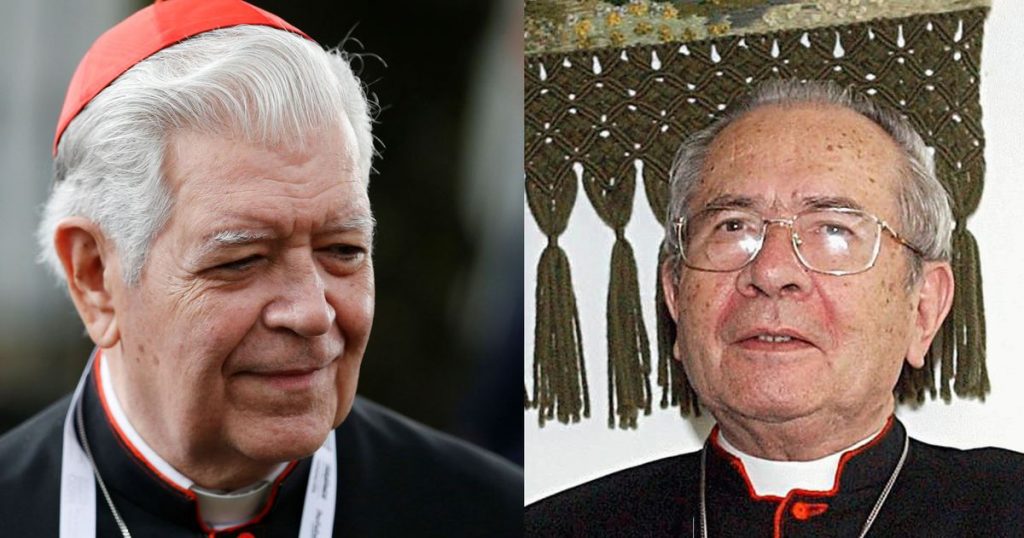ROME — Two titans of the Catholic Church in Latin America died the last week of September from complications related to COVID-19: Cardinal Jorge Urosa Savino, 79, of Venezuela, and Cardinal José Freire Falcão, 95, of Brazil.
The archbishop emeritus of Brasilia died Sept. 26, while the archbishop emeritus of Caracas died Sept. 23 after a monthlong battle with COVID-19 in the hospital.
Cardinal Falcão was archbishop of Brasilia for 20 years, from 1984 to 2004, and was made a cardinal by St. Pope John Paul II in 1988. He created the House of the Clergy in the diocese, and was credited with paying close attention to the presbyterate and their needs and helping organize the papal visit to Brazil’s capital in 1991. He took part in the conclave that elected Pope Benedict XVI in 2005.
His episcopal motto was “In humilitate servire” (“Serving in humility”), and he explained why more than once, with the general idea being, “I took as my motto, ‘Serving in Humility,’ because I put my pastoring in the Lord’s hands, because He never fails those who do the Father’s will, in following His call, in giving their yes.”
In a telegram following the death of the Brazilian prelate, Pope Francis recalled Cardinal Falcão’s many years of collaboration with the Holy See and his own meetings with “this pastor who was passionate about evangelization.” The two worked together in CELAM, the conference of bishops of Latin America and the Caribbean.
According to the pope, the late cardinal “was solicitous in putting the gifts received from the Lord at the service of the people of God and his brother Bishops.”
Though he spent his later years far from the spotlight, he helped shape Brazil’s Catholic education system, his country’s bishops’ conference (where he held several important roles through the years), and ecumenical efforts in Latin America.
Announcing Cardinal Urosa’s death Sept. 23, Cardinal Baltazar Porras, apostolic administrator of the Archdiocese of Caracas, asked “everyone to pray for his eternal rest as the church in Venezuela and the universal church mourns.”
Pope Francis expressed his condolences in a telegram to Cardinal Porras, remembering Cardinal Urosa as a “selfless shepherd who, throughout many years and with faithfulness, gave his life to the service of God and the church.”
Cardinal Urosa was hospitalized Aug. 27 after he was diagnosed with COVID-19 and was transferred to the intensive care unit the following day.
Pope Benedict XVI had named him the archbishop of Caracas in 2005, during a delicate period at the height of the left-wing movement known as “Chavismo,” sparked by the late Venezuelan President Hugo Chávez. Cardinal Urosa was not a man to keep quiet, but rather known as an outspoken voice against the government’s measures that led Venezuela toward the worst nonwar related crisis in the world.
The friction between the cardinal and the administration of Nicolas Maduro, who succeeded Chavez after his death in 2013, continued, with the prelate becoming one of the leading voices within the Church against the oppressive measures of the leader today widely acknowledged by Western countries as a dictator.
But his opposition to the regime never came in detriment of the people he was called to serve. On the contrary, the man who could easily get frustrated when speaking of the political and social reality of his country — where an estimated 95% of the population lives under the poverty line — wrote one final message in which he called, yet again, for dialogue.
On the week of his death, the Archdiocese of Caracas published a reflection, written by Cardinal Urosa at the end of last August, when he was already in the hospital. “I express my great affection for the Venezuelan people and my absolute dedication to their freedom, to its institutions, to the defense of people’s rights against abuses committed by national governments,” he wrote.
“And in this attitude, I have always acted, not out of hatred or resentment, but for the defense of freedom, justice, and the rights of the Venezuelan people. I hope that Venezuela comes out of this very negative situation,” he added.
The late Venezuelan cardinal did not necessarily see eye-to-eye with Pope Francis on some pastoral or theological issues. This was evident primarily during the Synod of Bishops on the Family, where Urosa was one of eight prelates who signed a letter to the pontiff expressing their concern over a push to allow holy Communion for divorced and civilly remarried Catholics.
Nevertheless, the cardinal always sided with the Argentine in public, particularly when it came to Venezuela: When many argued that the pope was sinfully silent regarding the country’s crisis, the cardinal would go out of his way to reaffirm that the bishops had his full support.
Both Cardinal Falcão and Cardinal Urosa lived most of their ministry long before Cardinal Jorge Mario Bergoglio was elected in 2013 to succeed Pope Benedict XVI. In the wake of their deaths, however, they are both being remembered as shepherds who sought to have “the smell of their sheep” long before their fellow South American bishop made it fashionable on the global scale.

